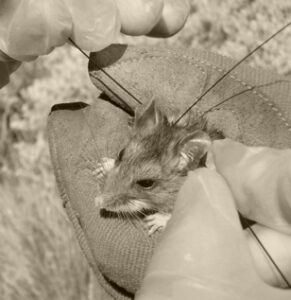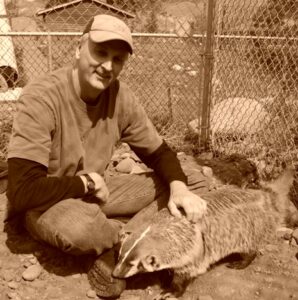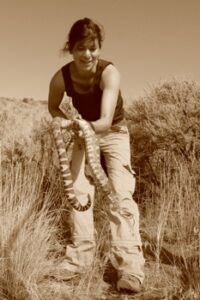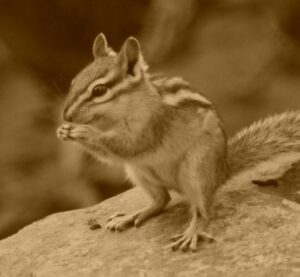Interests and Projects
 As you already may have noticed, I do not have a narrow ‘research agenda’ that involves working on a particular species or taxonomic group. I have a broad background in animal ecology, and as a result, my research interests are equally varied.
As you already may have noticed, I do not have a narrow ‘research agenda’ that involves working on a particular species or taxonomic group. I have a broad background in animal ecology, and as a result, my research interests are equally varied.
It has become very obvious to me over the years that any animal becomes utterly fascinating and intriguing the more you learn about it (just ask my students!). However, no matter what the animal of choice is, it remains important that the research is built on a foundation of one or more strong, fundamental questions in ecological theory. I have worked to keep this as a central tenet as the research in the lab: anyone intruding into the lives of animals through research needs to ensure they are doing ‘good science’.
 If I had to identify a particular area of animal biology that intrigues me, it would be the factors and mechanisms that drive the movements and (in some cases) settlement of animals. Various ecological concepts come into play here, including ‘dispersal’, ‘migration’, ‘habitat selection’ and ‘site fidelity’. Much of the work in my lab to date has involved some aspect of this broad field of study. When I started studying animal dispersal as a graduate student, it was mainly an academic pursuit with the development of theory almost outpacing the collection of relevant field data. Nowadays, understanding how animals explore habitat, choose to relocate, move between habitat patches, and successfully settle in new areas has become an incredibly important area in the management and conservation of wildlife. If you look over the short descriptions of my students’ research elsewhere on this website, you will see this common thread running through many of their projects.
If I had to identify a particular area of animal biology that intrigues me, it would be the factors and mechanisms that drive the movements and (in some cases) settlement of animals. Various ecological concepts come into play here, including ‘dispersal’, ‘migration’, ‘habitat selection’ and ‘site fidelity’. Much of the work in my lab to date has involved some aspect of this broad field of study. When I started studying animal dispersal as a graduate student, it was mainly an academic pursuit with the development of theory almost outpacing the collection of relevant field data. Nowadays, understanding how animals explore habitat, choose to relocate, move between habitat patches, and successfully settle in new areas has become an incredibly important area in the management and conservation of wildlife. If you look over the short descriptions of my students’ research elsewhere on this website, you will see this common thread running through many of their projects.
Beyond a doubt, graduate and undergraduate students are the most important component of my research initiatives. Through all this, I feel very fortunate to be spending my time working alongside devoted students, and helping them develop their passion and skills in wildlife ecology. I enjoyed tremendously my own time in graduate school, and I like to think my own students leave with some of that same satisfaction (I have been awarded the Graduate Student Mentor award at TRU). I encourage undergraduates working with me to rub shoulders with graduate students as much as possible, in order to see the opportunities that lie ahead. In fact, undergraduate research has been extremely important in my lab for helping to provide groundwork for more elaborate, graduate-level research. As well, the vast majority of undergraduates working in my lab have gone on to conduct their own graduate studies here or elsewhere.
are the most important component of my research initiatives. Through all this, I feel very fortunate to be spending my time working alongside devoted students, and helping them develop their passion and skills in wildlife ecology. I enjoyed tremendously my own time in graduate school, and I like to think my own students leave with some of that same satisfaction (I have been awarded the Graduate Student Mentor award at TRU). I encourage undergraduates working with me to rub shoulders with graduate students as much as possible, in order to see the opportunities that lie ahead. In fact, undergraduate research has been extremely important in my lab for helping to provide groundwork for more elaborate, graduate-level research. As well, the vast majority of undergraduates working in my lab have gone on to conduct their own graduate studies here or elsewhere.
 Partnerships also factor heavily into my work. Most of the work conducted by my students has the involvement of colleagues in government, industry, non-profit organizations, agencies, and other fields of academia. This is important for helping the students develop contacts in the outside ‘real’ world and creating a responsibility to stakeholders. Equally important, these partnerships also bring an enormous amount of expertise and knowledge to bear on the research we conduct, which in no small measure has contributed to the diversity of animals and problems studied in my lab.
Partnerships also factor heavily into my work. Most of the work conducted by my students has the involvement of colleagues in government, industry, non-profit organizations, agencies, and other fields of academia. This is important for helping the students develop contacts in the outside ‘real’ world and creating a responsibility to stakeholders. Equally important, these partnerships also bring an enormous amount of expertise and knowledge to bear on the research we conduct, which in no small measure has contributed to the diversity of animals and problems studied in my lab.
At the present time I have no firm plans to start any new MSc projects in the foreseeable future, largely because I am just a few short years away from the Big R (retirement). .However, if the right project comes along I may reconsider. Prospective students wishing to explore potential thesis projects should reach out using the contact information available elsewhere on this website. Sending an unofficial copy of your transcripts along with your resume/Cv helps start the dialogue. Please keep in mind that a reasonably high GPA is needed for entry and success in graduate school (77% is the minimum at TRU, but the higher the better). I also look for students with strong course work, experience and a demonstrated interest in animal ecology, wildlife biology, or a related discipline. Also, because I have only a few more years remaining before retirement, any students that enter the lab MUST do so with a clear commitment to remaining on the TRU campus until they finish their studies: I can no longer consider students that envision departing from campus to work on their thesis from a distance, as this very typically greatly extends the time taken to finish.
